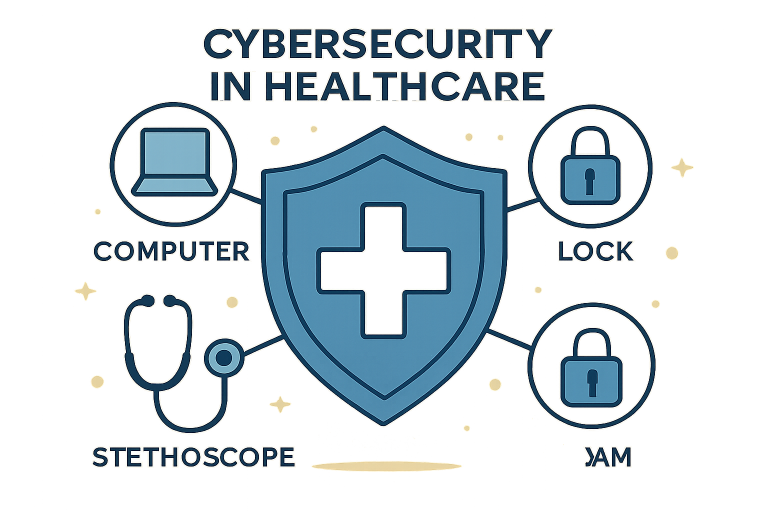Cybersecurity is vital in healthcare, protecting patient data and medical systems amid rising threats and strict regulations. Professionals need skills in tech, regulation, and communication. As digital health tools grow, demand for cybersecurity experts increases.
Organizations invest in talent to secure data and maintain trust. Success requires risk management, tech skills, soft skills, and continuous learning. This article highlights key competencies for healthcare cybersecurity professionals to ensure security and compliance.
Understanding Healthcare Regulations
Comprehensive knowledge of healthcare-specific regulations is vital for all cybersecurity professionals in this field. Laws like the Health Insurance Portability and Accountability Act (HIPAA) in the United States mandate strict protocols for protecting Protected Health Information (PHI). Partnering with or becoming certified healthcare cybersecurity experts ensures a deeper understanding of these complex legal requirements and the best practices for maintaining compliance.
Compliance is not just a legal box-checking exercise but a foundation for organizational trust and operational resilience. Experts must stay informed about evolving regulations and ensure that policies, staff training, and technical safeguards are consistently aligned with current legislative requirements.

Risk Management
Effective risk management is a linchpin skill, helping organizations prioritize and address their most significant vulnerabilities. Professionals routinely perform risk assessments to identify gaps in security controls and quantify the potential impacts of various threats. This approach enables focused investment in risk mitigation, from technical patching to staff awareness campaigns.
Ongoing task cycles—such as vulnerability scanning and penetration testing—ensure that organizations proactively adapt to new risks as they emerge, significantly reducing the likelihood of devastating breaches.
Incident Response and Digital Forensics
Even the most robust security environment can be breached. Rapid detection, containment, and remediation of incidents are critical to minimizing harm. Healthcare cybersecurity experts need to be prepared with well-documented, regularly tested incident response plans. Essential steps include isolating affected systems, eradicating threats, and restoring normal operations securely.
In parallel, digital forensics capabilities are invaluable for thoroughly investigating breaches—identifying points of entry, attack vectors, and the scope of compromised data. Such skills not only support recovery but are crucial for legal proceedings and long-term improvements.
Proficiency in AI and Machine Learning
The rise of AI and machine learning has transformed healthcare cybersecurity by enabling automated threat detection and dynamic defense mechanisms. Professionals fluent in these technology domains can harness behavioral analytics to detect intrusions in real-time, flag unusual activity, and respond to emerging threats before they escalate.
Familiarity with AI-powered tools and an understanding of their operational limitations allow cybersecurity leaders to deploy advanced defenses while remaining vigilant about potential new attack techniques that target these technologies themselves.
Zero Trust Architecture Implementation
With distributed workforces, remote care, and growing use of cloud applications, traditional network perimeter defenses have lost their effectiveness. The Zero Trust model assumes no implicit trust for any user, device, or application, regardless of their location within or outside the organization’s network.
Key skills include deploying Multi-Factor Authentication (MFA), implementing micro-segmentation to limit lateral movement, and using continuous risk evaluation. Professionals with expertise in Zero Trust can elevate security while maintaining usability for staff and clinicians.
IoT and OT Security
Internet of Things (IoT) devices and Operational Technology (OT) systems—from smart infusion pumps to building management platforms—are proliferating throughout healthcare. These assets often lack robust security controls and can serve as entry points for attackers.
Cybersecurity experts must be proficient at inventorying, securing, and continuously monitoring these devices. Fluency in IoT standards and incident handling in OT environments is increasingly indispensable. Continual education in this rapidly evolving landscape is crucial for effective risk mitigation.
Communication and Collaboration
The technical skills of a cybersecurity expert are only as practical as their ability to communicate with leadership, clinicians, and IT teams. Translating complex cyber risks and the rationale behind security strategies into plain language supports buy-in across the organization.
Collaboration ensures all departments are aligned around common goals, compliance priorities, and rapid response in crises. Regular briefings, training sessions, and simulation exercises foster a culture where every employee is engaged in maintaining the organization’s security posture.
Continuous Learning and Certifications
Healthcare cybersecurity is rapidly evolving. Professionals pursue ongoing education and certifications, such as CISSP, CEH, and healthcare-specific security credentials, to stay prepared for emerging threats. Mastery in compliance, risk management, incident response, and communication is vital to protect institutions’ safety and reputation.
Conclusion
Healthcare cybersecurity demands a balance of technical expertise, regulatory awareness, and proactive adaptability. From mastering compliance frameworks like HIPAA to implementing Zero Trust architectures and securing IoT devices, professionals must remain vigilant in an ever-changing threat landscape.
Equally important are soft skills—such as effective communication, collaboration, and continuous learning—to ensure that security measures are understood and supported across all levels of an organization.
By combining strong technical foundations with a commitment to education and innovation, healthcare cybersecurity experts play a vital role in safeguarding patient data, maintaining trust, and strengthening the resilience of healthcare systems worldwide.
